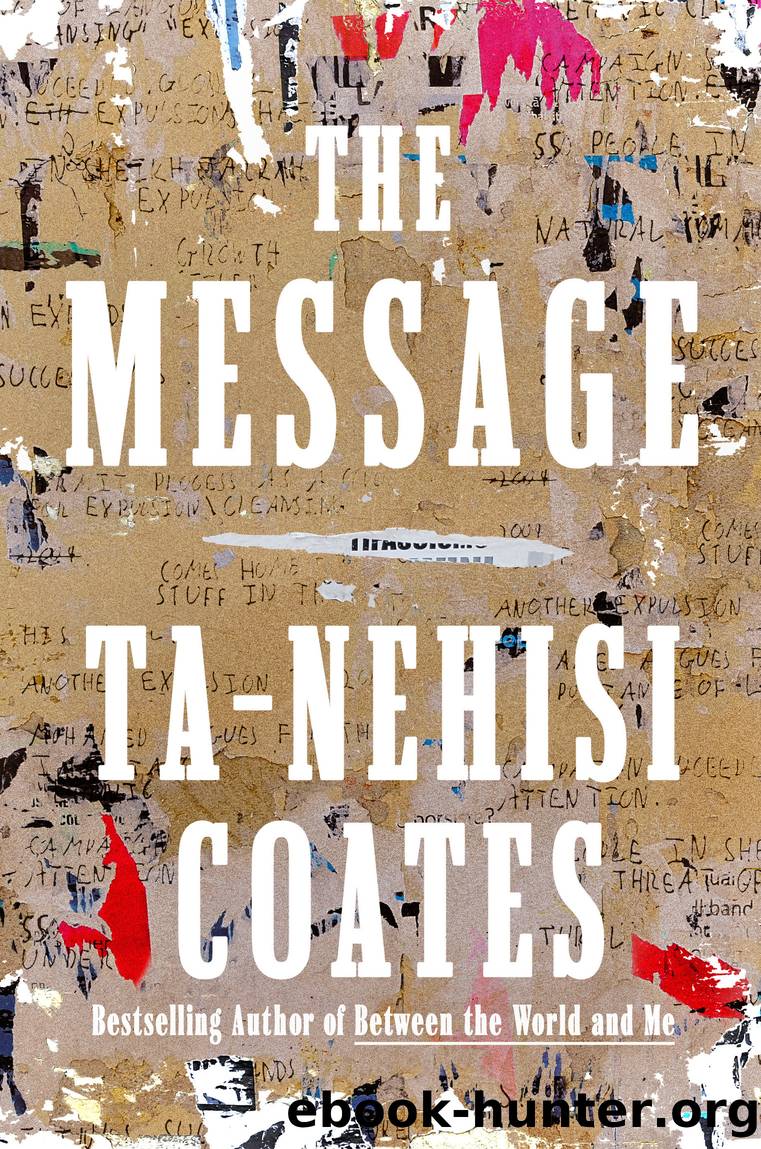The Message by Ta-Nehisi Coates

Author:Ta-Nehisi Coates [Coates, Ta-Nehisi]
Language: eng
Format: epub
Publisher: Random House Publishing Group
Published: 2024-10-02T00:00:00+00:00
* * *
â
When I think of my earliest days as a writer, what I recall is a kind of longingâI felt everything I wished to say, even if I didnât exactly know it. There was so much I did not understand, and what I did understand I could never say with all the layers and color that would truly convey that understanding to my reader. I would fall in love with some girl and find my emotions so dominated that the only vent I had was writing it down. But when I pulled out my black-and-white composition notebook and put pen to paper, what I saw instead were the words of a thousand other men who had gone before me. I had no voice, which is to say no cadence, no lexicon, no sense of beauty I could call my own. I would stay up late reading Etheridge Knightâs âAs You Leave Me,â over and over wondering how the hell he did it. What does it mean to watch a woman you love âdisappear in the dark streets/to whistle and smile at the johnsâ? I was so young. I knew what it was to want one way and to be wanted in anotherâbut not like this, not with a woman who went out âto whistle and smile at the johns.â That phrase was such an elegant description of sex work that I think that even if Etheridge Knight himself had never had that experience, he knew enough about the life to make us feel like he had. There was a lesson for me in that. I know there are writers who can imagine a world from nothing. But Iâm not one of them. The sense of beauty I was seeking had to emerge from knowledge.
Ten years ago, I acquired the sense that all of the skills and techniques I have discussed with youâthe beauty inherent in the feel and rhythm of words, the great import of direct reporting and deep research, the force of active and intentional language, the power of tense, the gravity of historyâwas at last in my clutches. I did not think myself a master of this entire arsenal, but I felt that I well understood its uses. And more, I had, shockingly to me, found myself writing for The Atlanticâa storied magazine, with the resources to gird and strengthen my writing. This was crucial. I trace myself back to a line of autodidact writers, men and women who felt themselves in possession of some essential truth but were forced to testify to that truth without fact checkers, copy editors, and access to distant archives and expensive databases to perfect that testimony. But I now had those tools, and I understood that whatever power I now felt I possessed as a writer, the amplifying power of the institution around me was indispensable.
All this I brought to bear, at length, in an essay for The Atlantic, âThe Case for Reparations.â As I wrote, I could feel it flowing
Download
This site does not store any files on its server. We only index and link to content provided by other sites. Please contact the content providers to delete copyright contents if any and email us, we'll remove relevant links or contents immediately.
| General | Discrimination & Racism |
Nudge - Improving Decisions about Health, Wealth, and Happiness by Thaler Sunstein(7706)
The Fire Next Time by James Baldwin(5440)
iGen by Jean M. Twenge(5414)
Adulting by Kelly Williams Brown(4574)
The Sports Rules Book by Human Kinetics(4385)
The Hacking of the American Mind by Robert H. Lustig(4381)
The Ethical Slut by Janet W. Hardy(4251)
Captivate by Vanessa Van Edwards(3839)
Mummy Knew by Lisa James(3691)
In a Sunburned Country by Bill Bryson(3541)
The Worm at the Core by Sheldon Solomon(3486)
Ants Among Elephants by Sujatha Gidla(3467)
The 48 laws of power by Robert Greene & Joost Elffers(3291)
Suicide: A Study in Sociology by Emile Durkheim(3022)
The Slow Fix: Solve Problems, Work Smarter, and Live Better In a World Addicted to Speed by Carl Honore(3009)
The Tipping Point by Malcolm Gladwell(2920)
Humans of New York by Brandon Stanton(2873)
Get What's Yours for Medicare: Maximize Your Coverage, Minimize Your Costs by Philip Moeller(2726)
Handbook of Forensic Sociology and Psychology by Stephen J. Morewitz & Mark L. Goldstein(2704)
